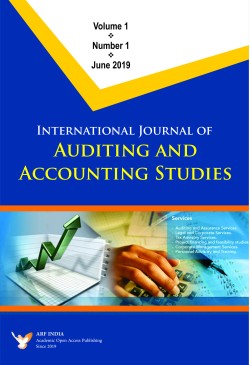
International Journal of Auditing and Accounting Studies
Frequency :Bi-Annual
ISSN :2582-3272
Peer Reviewed Journal
The purpose of this research is to explore challenges facing audit firms when their clients are migrating from paper based to computerised platforms. Since most of the information will be available in paperless, it requires the audit to correspond to technology-based processes which has resulted into various challenges that have not been addressed in the prior studies. An exploratory study was conducted through semi-structured interviews on thirteen (13) external auditors in a developing country (Tanzania) where e-business is gaining momentum. Data was analysed in themes with the help of Nvivo software which fostered transparency and categorisation of themes. Themes were summarised in a tree map and interpreted there in. The findings revealed that in the past five years audit firms in Tanzania were in a transition from manual to technology-based audit processes. However, during this transition, the firms were experiencing financial and technical challenges; individual, organisational and stakeholders’-related challenges. The study concludes with suggestions from the respondents on the involvement of various accounting/auditing stakeholders in minimising the challenges. This study shades light for audit firms to understand the challenges related to technology usage by their clients which calls for a change in the audit methodology. It is contended that if traditional audit methodologies continue to be used to audit computerised clients, significant risks may go undetected.
Key words: External auditors, challenges, IT, audit firms, computing platforms
JEL Classification: M41, M42, M15
The increasing interest in sustainability reporting through the publication of related reports has boosted the interest in assessing the accuracy of such reports which has led to the emergence of the sustainability assurance and the sustainability rating fields. In this paper, we try to identify the determinants of the gap between the level of sustainability assurance issued by the assurance provider and the sustainability ratings provided by the Vigeo rating agency. A double theoretical framework is used in this study, namely, the contractual and the neo-institutional theories. These theories have been widely used over the past years as a basis to explain the sustainability reporting. We haveexamined the sustainability reports of the CAC40’s companies as well as their sustainability ratings provided by Vigeo for the period between 2004 and 2012. The empirical findings revealed that, the sector’s sensitivity, the regulatory pressures, the label and the size of the company have shown a significant impact on the existing gap between sustainability assurance levels and Vigeo’s sustainability ratings for the CAC40 companies.
Keywords - sustainability assurance, assurance level, sustainability rating, Grenelle 2 law.
Since extant literature does not possess empirical evidence on the impact of International Financial Reporting Standards (IFRS) adoption in Sri Lanka, the present study attempts to investigate the impact of IFRS adoption on performance of listed companies in Sri Lanka. Therefore, the purpose of this paper is to investigate whether there is a significant change in financial and market performance of listed companies in the Colombo Stock Exchange (CSE), Sri Lanka. Data related to financial performance of all listed companies from 2009 to 2016 which includes data of pre-IFRS adoption period (2010 -2011) and post-IFRS adoption period (2012-2016) were collected from audited financial statements. Stock market performance of selected companies was computed based on data available in the CSE data library. Descriptive statistics and Analysis of Variance technique were used to obtain statistics to test the hypothesis of the present study. Empirical evidence of the study indicates that there is a significant change in firm performance of Sri Lankan listed companies after the IFRS adoption. This study adds new findings to the accounting literature by investigating the impact of IFRS adoption in Sri Lanka.
Keywords: IFRS adoption, Financial Performance, Market Performance, CSE, Sri Lanka
Corporate Social Responsibility (CSR) is a main path for companies to react to the societal requirements in the surroundings in which they operate. The interest of CSR initially developed in line to the society’s growing concern for the environment, human rights, ethical values in business, and for other social aspects. Various firms facing increase in burden to perform in a publicly responsible way and they create codes of ethics, circulate CSR statements and reports, and invite in stand-alone assessors to evaluate the execution of their CSR procedures and practices. This research makes an attempt to identify the aspects upsetting CSR implementation and various barriers encountered by the port and shipping industry in Malaysia. Data had been collected through questionnaire survey, interviews and together with secondary data (library research). Data was analysed using SPSS. Using multiple regression, the study reports that there are various factors impede CSR implementation such as cost, regulations, stakeholders’ willingness and environment. Besides that, the port and shipping industry is faced with many challenges such as lack of resources, lack of strategic vision, lack of measurement systems, low willingness to pay for CSR and high regulatory standard in implementing CSR which has divided into firm-specific and industry-specific barriers.
Keywords: Corporate Social Responsibility, Port and Shipping Industry, Stakeholders, Cost, Regulations.
The main objective of this paper is to examine the business ethics practices in Sub Saharan (SSA). Using survey data obtained from 81 listed companies operating in Ghana, Kenya, Nigeria, Zimbabwe and South Africa we find that the most common business ethics policies employed by the responding companies were statement on corruption/bribery, conflict of interest policy, policies and practices in relation to fraud and corruption, and statement on gifts and entertainment by outsiders, probably responding to the fight against corruption in the Sub Saharan Africa region. Furthermore, lack of senior management support, cultural/societal factors/expectation and lack of sufficient financial resources were the challenges hindering the adoption of business ethics practices in SSA.
Key Words: Business Ethics, Corporate Social Responsibility, Sub Saharan Africa